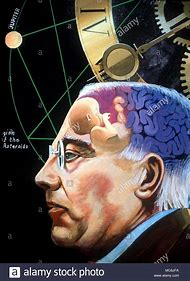The Fourth Way - Study of Oneself - P.D.Ouspensky







The Fourth Way - Study of Oneself - P.D.Ouspensky
Serious study begins in this system with the study of psychology, that is to say with the study of oneself, because psychology cannot be studied, as astronomy can, outside oneself. A man has to study himself. When I was told that, I saw at once that we do not have any methods of studying ourselves and already have many wrong ideas about ourselves. So I realized we must get rid of wrong ideas about ourselves and at the same time find methods for studying ourselves.
Perhaps you realize how difficult it is to defin e what is meant by psychology?Ther are so many meanings attached to the same words in different systems that it is difficult to have a general definition. So we begin by defining psychology as study of oneself. You have to learn certain methods and principles and, according to these principles and using these methods, you will try to see yourselves from a new point of view.
If we begin to study ourselves we first of all come up against one word which we use more than any other and that is the word 'I'. We say 'I 'am doing', 'I am sitting', 'I feel', ' I like', 'I dislike' and so on. That is our chief illusion, for the principal mistake we make about ourselves is that we consider ourselves as one; we always speak about ourselves as 'I' and we suppose that we refer to the same thing all the time when in reality we are divided into hundreds and hundreds of different 'I's.At one moment when I say 'I' it is quite another 'I' speaking. We do not know that we have not one 'I', but many different 'i's connected with our feelings and desires, and have no controlling 'I'. These 'I's change all the time; one suppresses another, one replaces another, and all this struggle makes up our inner life.
'I's which we see in ourselves are divided into several groups. Some of these groups are legitimate, they belong to the right divisions of man, and som e of them are quite artificial and are created by insufficient knowledge and by certain imaginary ideas that man has about himself.
To begin self-studyit is necessary to study methods of self-observation, but that again must be based on a certain understanding of the divisions of our functions. our ordinary idea about these divisions is quite wrong. We know the difference between intellectual and emotional functions. For, instance, when we discuss things, think about them, compare them, invent explanations or find real explanations, this is all intellectual work; whereas love, hate, fear, suspicion and so on are emotional. But very often, when functions; when we really feel, we call it thinking, and when we think we call it feeling. But in the course of study we shall learn in what way they differ. For, instance, there is an enormous difference in speed, but we shall speak more about that later.
Then there are two other functions which no system of ordinary psychology divides and understands in the right way - instinctive function and moving function. Instinctive refers to the inner work of the organisms: digestion of food, beating of the heart, breathing - these are instintctive functions. To instinctive belong also ordinary senses-sight, hearing, smell, taste, touch, the feeling of cold and warmth, things like that; and this is all, really. Of outer movements, only simple reflexes belong to instinctive function, because more complicated reflexes belong to moving function. It is very easy to distinguish between instinctive and moving functions. We do not have to learn anything that belongs to instinctive function, we are born with the capacity to use all the instinctive functions. Moving functions, on the other hand, all have to be learned-a child learns to walk, to write and so on. There is a great difference between the two functions, since there is nothing inherent in moving functions, and instinctive functions are all inherent.
In self-observationit is necessary first of all to divide these four functions and to classify at once everything that you observe, saying, 'This is in tellectual function'. 'This is emotional function' and so one.
If you practise this observation for some time you may notice some strange things. For instance, you will find that what is really difficultin observing is that you forget about it. You start to observe, and your emotions connect with some kind of thought and you forget about self-observation.
Again, after some time, if you continue with this effort to observe, which is a new function not used in the same way in ordinary life, you will notice another interesting thing- that generally you do not remember yourself. If you could be aware of yourself all the time, then you would be able to observe all the time, or in any case as long as you liked. But because you cannot remember yourself, you cananot concentrate; and this is why you will have to admit that you have no will. If you could remember yourself, you would have will and could do what you liked. But you cannot remember yourself, you cannot be aware of yourself, and so you have no will.You may sometimes have will for a short time, but it turns to something else and you forget about it.
This is the situation, the state of being, the state from which we have to start self-study. But very soon, if you continue, you will come to the conclusion that almost from the very beginning of self-study you have to correct certain things in yourself which are not right, to arrange certain things which are not in their right places. The system has an explanation for this.
Articles-Popular
- Main
- Contact Us
- Planetary Existences-2
- Planetary Existences
- TWO REVELATIONS-2
- Jeffery Epstein - The Saga - 9
- Jeffery Epstein - The Saga - 8
- Jeffery Epstein - The Saga - 10
- The Two Revelations
- The Fourth Way - Study of Oneself - P.D.Ouspensky
- Impeachment Investigators Subpoena White House - Ukraine
- Universality of Initiation
- The Path Of Initiation
- Initiation and the Devas
- The Participants In The Mysteries-2
- The Fourth Way - Wrong Functions - P.D Ouspensky
- The Final Initiation
- Statues are a mark of honour. Like Edward Colston, Cecil Rhodes and Oliver Cromwell have to go
- Discipleship - Group Relations - 2
- The Probationary Path - 2
- The Participants In The Mysteries
- Discipleship - Group Relationships
- Discipleship
- The Succeeding Two Initiations
- Jeffery Epstein - The Saga - 7
- Jeffery Epstein - The Saga - 6
Articles - Latest
- They Lied to Us! The Truth They Hid About Hitler’s Death — Gerard Williams
- Ramaposa Dragged Out of Parliament
- Madagascar Goverment Collapse
- The Reality of Digital Id
- Welcome To The End Of Western Dominance
- Why is the Sahel turning its back on France?
- Sarkozy gets 5 years in prison in Gadhafi case
- The EU in 2025: A union at the crossroads of chaos
- Deep distrust of EU leaves Italy's Meloni in a corner over bailout fund
- Regime crisis in France: Bayrou falls, now Macron must go!
- Idi Amin president of Uganda
- Anger at Starmer's 'surrender deal' that hands Spain control over Gibraltar border
- Iran doubles down as US signals Israel could strike during nuclear talks
- What could have caused Air India plane to crash in 30 seconds?
- WW3 fears explode as Britain now Russia's 'enemy number 1' - even ahead of Ukraine





